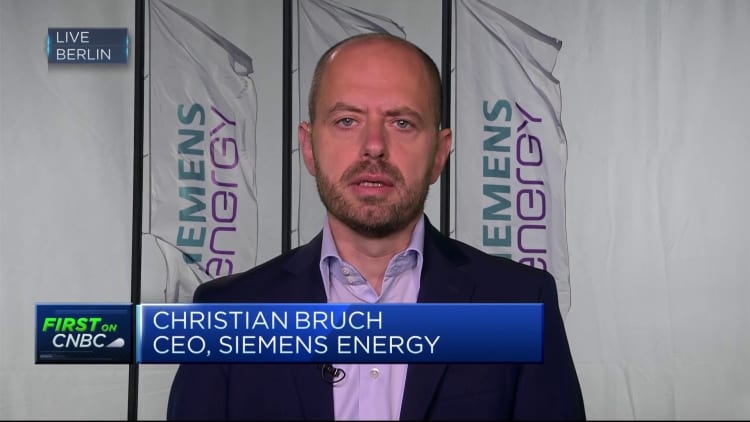
Siemens Energy CEO Christian Bruch said Monday that the company needs to slow down its rollout of new products after booking 2.2 billion euros ($2.4 billion) in costs due to quality issues at its wind turbine unit.
In June, Siemens Energy scrapped its profit forecast and warned that costly failures at wind turbine subsidiary Siemens Gamesa could drag on for years, sending Siemens Energy shares tumbling.
The Siemens Gamesa board is currently undergoing a review of the quality issues, which some analysts have suggested could turn out to be pervasive across the industry.
"The quality problems really result from the past, but I think we have too fast rolled out platforms into the market," Bruch told CNBC's "Squawk Box Europe" on Monday.
"That is not a cost issue per se, that is really a quality issue in terms of going too fast with new products into the market. The other thing is obviously now stabilizing the business in terms of ramping up new factories."
Though well below worst-case estimates, Siemens Energy said the 2.2 billion euro hit will push its net loss for the year to around 4.5 billion euros —significantly worse than previously expected.
Shares in the company whipsawed throughout Monday's trade, opening 5% lower and recovering to gain more than 4%, before retreating once again to trade 5% lower by mid-afternoon in Europe.
On a positive note, Siemens Energy — born from the spinoff of the former gas and power division of German conglomerate Siemens — posted strong growth in orders and revenue, and logged a record order backlog of 109 billion euros in its fiscal third-quarter earnings report Monday.
"I still believe the market itself, and you see that with the 7.5 billion orders we've got in the wind business this quarter, is a very interesting growth market," Bruch added.
"However, obviously, it has to be set up in a way that you can run a profitable business, and obviously making sure that we slow down this fast rollout of new products is a key element in this."
Siemens Energy said a "favorable market environment" saw it book orders of 14.9 billion euros for the quarter, reflecting 54.2% year-on-year growth, primarily driven by large orders at Siemens Gamesa and Grid Technologies.
Revenue increased by 8% on a comparable basis to 7.5 billion euros, but the company recorded a net loss of 2.93 billion euros compared with the 564 million euro loss reported for the same quarter of 2022.
This included "negative tax effects from valuation allowances on deferred tax assets in connection with the charges at Siemens Gamesa," the company said.
Siemens Energy plans to shift its focus to fewer product platforms and target certain regions for development, Bruch said, adding that a detailed strategy will be laid out at the company's capital markets day in November.
Deutsche Bank on Monday reiterated its hold rating on Siemens Energy stock, noting that commercial dynamics remained strong.
"Operationally, all divisions performed well, with the exception of Gamesa. In particular, Gas Services beat on revenue and profit by 5% and 25%, respectively, with a solid margin of 10.9%, 170 [basis points] above consensus," Gael de-Bray, European head of capital goods research at Deutsche Bank, highlighted.
Siemens Energy posted negative free cash flow of 55 million euros for the fiscal third quarter, including a pretax outflow of 393 million euros at Gamesa, which was not as bad as feared.
"The cash-out related to Gamesa issues is, however, expected to materialize in the next few years. At June-end, the group's adjusted net debt (including pensions) rose to €919m," de-Bray added.
"Given the inherently risky nature of the business ... and remaining uncertainties regarding the turnaround of Gamesa, we continue to believe that a 10% capital increase could be needed to keep the group's finances on the safe side."

